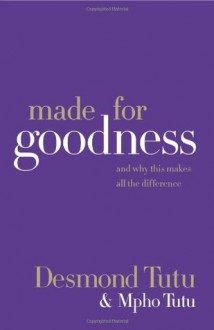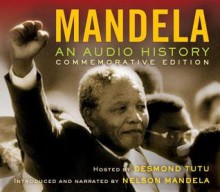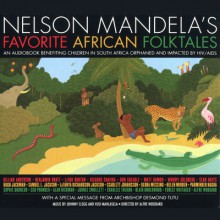
In Made for Goodness, Archbishop Desmond Tutu, Nobel Peace Prize winner and international icon of peace and reconciliation, shares his vision on why we can find hope and joy in the world’s darkest moments by realizing that we were made for goodness, that we are wired so that goodness will win in the end. Archbishop Tutu is a spiritual leader and symbol of love and forgiveness on the level of Gandi, Mother Teresa, Dr. Martin Luther King, Jr., and Nelson Mandela. Made for Goodness, written with his daughter Mpho, is one of the most personal and inspirational books he's ever written.
Amazon.com
Archbishop Desmond Tutu is a Nobel Prize winner (1984) and a survivor of not only an abusive childhood at the hands of an alcoholic father, but also of the apartheid era in Africa. In this book, which he writes with his daughter Mpho (pronounced mm-POH, btw) who is also an archbishop, finally addresses the topic he's been asked about most over the years --- how does he manage to stay happy, given what he's been through? How does he continue to see good in the world and not lose faith in humanity? In under 300 pages of illustrative stories of hope and faith, he gives you your answer.
Desmond's path has not been an easy one. Remember the alcoholic, abusive father I mentioned? He was actually principal of Desmond's elementary school in Johannesburg, South Africa when Desmond was a child. No escape for the poor kid! But he endured, survived and went on to become educated and highly respected within a career of service. By the time apartheid in Africa reared its ugly head, Desmond was a father himself. One of the quietest actions to signal the fight to come was when the lunch program was canceled for all black children in South African schools, though white students were still served. Then Prime Minster Hendrik Verwoerd's official statement on the decision? "We can't provide for all the children, so we won't provide for any." That moment was cruel enough but ohh if only the fight had stopped there! If you've read up on your history regarding this time, you're aware of the bloodshed that was to follow all across the country.
Desmond takes up the position of archbishop of Cape Town, South Africa. During apartheid, he serves as president of All Africa Conference of Churches. In the apartheid's aftermath, he becomes chairman of South Africa's Truth and Reconciliation Committee, dedicated to helping shattered families emotionally and physically rebuild their lives. His daughter Mpho worked alongside Desmond as a counselor to emotionally, physically or sexually abused women & children, rape victims and / or drug addicts. So you can guess, they were in the thick of it, seeing humans at their darkest, lowest emotional states. There must have been days where Desmond and Mpho had to have lost heart! This whole book is Desmond describing how they were able to stay strong in a world full of cruelty and depravity, dedicating themselves anew each day to building up rather than tearing down.
Your whole life is holy ground.
~ Desmond Tutu
Desmond's work in South Africa, as well as time spent working in a refugee camp in Darfur, drove him to develop the Desmond Tutu Peace Foundation. In 2009, President Barack Obama awarded Tutu the Presidential Medal of Freedom.
Archbishop Tutu ends each chapter of the book with a prayer poem, giving the reader something to contemplate on, regarding struggles within their own life. If you wish to pray on something troubling you but don't know how to go about wording it, these can be a useful tool to help guide your mind to a peaceful place. Tutu hits upon some solid truths on the subjects of truth, faith and general perseverance through life. While his message did get a little repetitive in parts for me, I can't argue with the message itself. The man's been put through the fire and came out the other side an intact happy man. His words have been field-tested, you could say!
One thing that Tutu stresses in these chapters that did really resonate with me is the need to be realistic with oneself. We should all be striving for everyday kindness for humanity, but also keep in mind you don't have to be a perfect saint. You will have days where you get angry, where you break down, where you feel like you're not doing enough or that your efforts are pointless because the world is just too damaged. To this line of thinking he gives the reader this in return:
There is a relief worker who resides in our soul. In each of us, there is a dignified Darfuri, one who can find occasion for gratitude and joyful laughter in almost any circumstance. To whatever extent we recognize and act on those traits, they are there and want to be expressed. We can always aspire to be more compassionate and more generous, not out of some dogged need to be good or to be lovable, but because to give love is our greatest joy.
I was also moved by Tutu's words on "ubuntu", the South African way of describing everything and everyone in the world being interconnected.
Some of the hardest truth to take (though the guy is right!) is when he breaks down the idea of freedom of choice. Admittedly, an amazing gift, but as he points out... it comes with a caveat. Freedom of choice also means potential for people to choose wrongly or poorly, which will likely affect a great many people. Could be you, could be someone else. So then he says, if your life has been negatively affected by the poor choices of others, you THEN have the choice to CHOOSE to forgive them or carry the weight of that anger / sadness / disappointment etc within yourself for however long you choose. Freedom of choice doesn't always mean everyone wins, but it gives you the freedom to choose how you react to the options provided.
I did really love Mpho's stone exercise for releasing hurt feelings, so I thought I would share it here: Mpho says to take a small stone that can fit in a pocket (but some with noticeable weight to it), put it in your pocket and throughout the day tell the rock what is troubling you. Whenever you feel that hurt or anger bubbling back up, voice it to the rock. At the end of the day, find someplace to set the rock down and mentally set down your weighted mind with it. Then walk away. Leave the rock there and walk away with a lightened spirit.
Worth a shot!

 Log in with Facebook
Log in with Facebook 









